Analysis of Health and Socio-Political Issues in Aged Care
VerifiedAdded on 2022/09/14
|9
|2161
|22
Report
AI Summary
This report examines the multifaceted health and socio-political issues impacting aged care. It begins by exploring strategies for encouraging the older population, highlighting the benefits of community-based services and transition programs. The report then analyzes the challenges faced by health service delivery in the context of an aging population, emphasizing the Healthy Ageing Model of care and its person-centered approach. The report further discusses the healthy ageing model and its support for older populations, including its role in daily activities, healthcare access, and social engagement. Finally, the report critically evaluates the user-pays system in Australia, considering its political and ethical implications, particularly its impact on social equity and ethical principles like utilitarianism and beneficence, and the challenges faced by vulnerable populations. The report utilizes several academic references to support the findings and arguments.
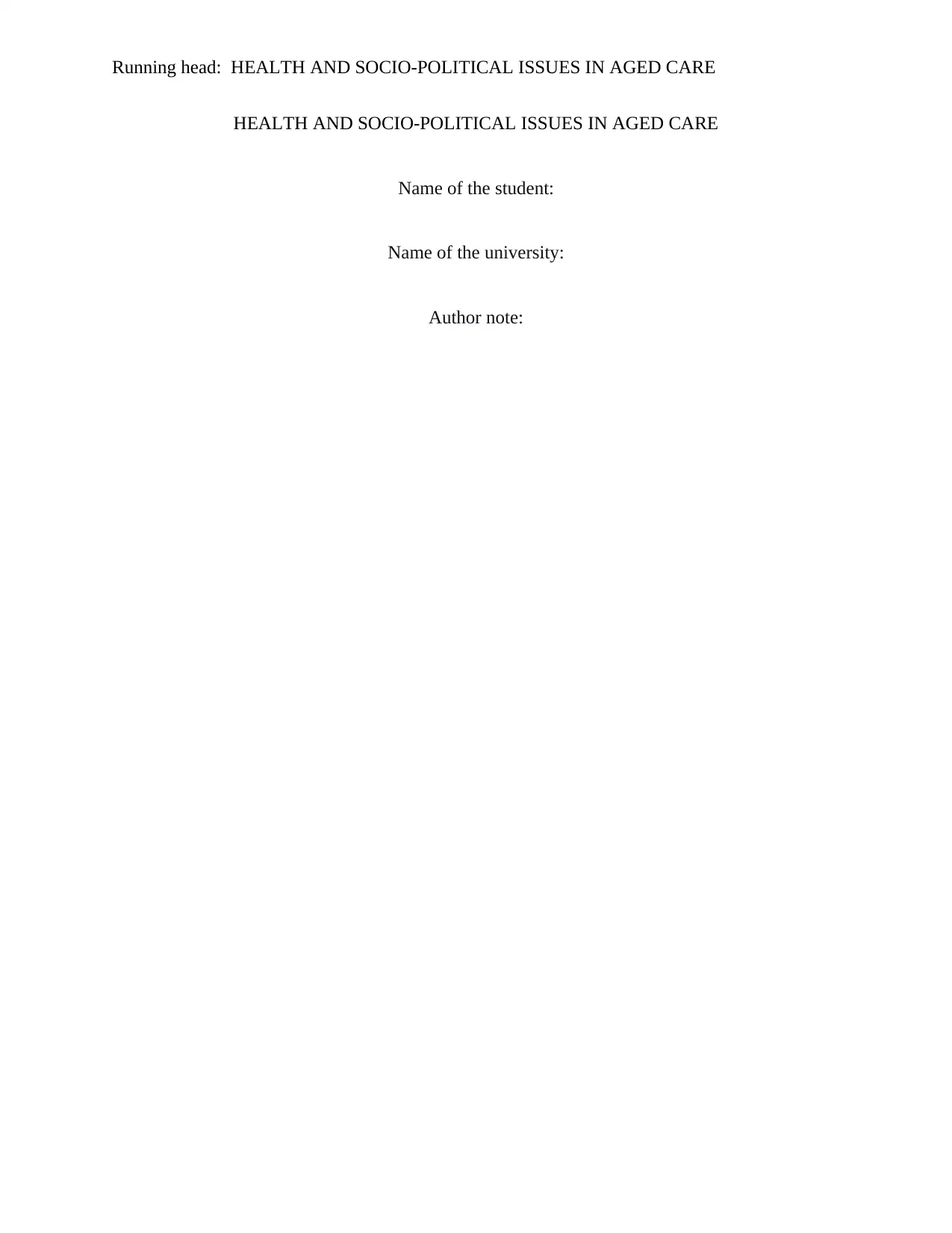
Running head: HEALTH AND SOCIO-POLITICAL ISSUES IN AGED CARE
HEALTH AND SOCIO-POLITICAL ISSUES IN AGED CARE
Name of the student:
Name of the university:
Author note:
HEALTH AND SOCIO-POLITICAL ISSUES IN AGED CARE
Name of the student:
Name of the university:
Author note:
Paraphrase This Document
Need a fresh take? Get an instant paraphrase of this document with our AI Paraphraser
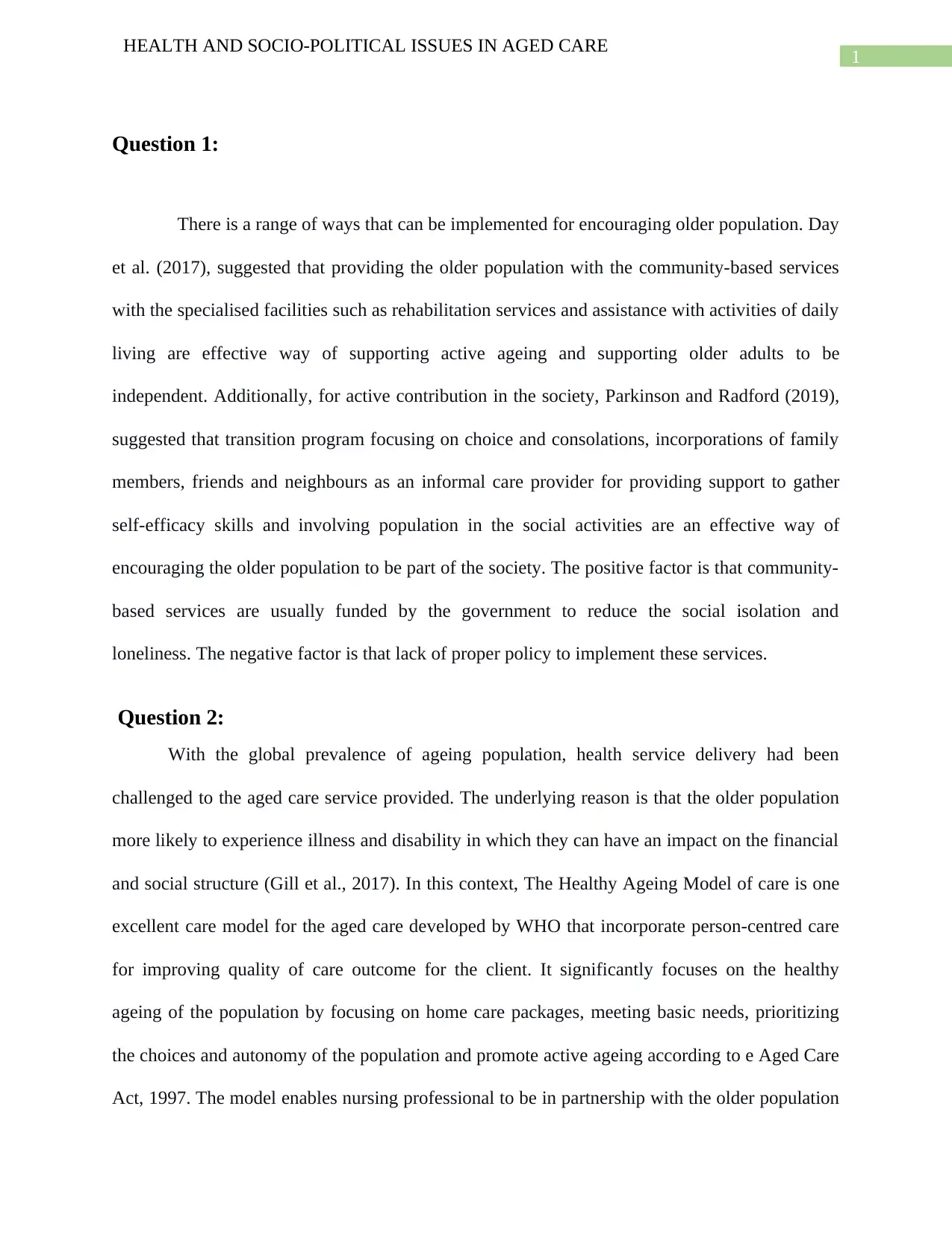
1
HEALTH AND SOCIO-POLITICAL ISSUES IN AGED CARE
Question 1:
There is a range of ways that can be implemented for encouraging older population. Day
et al. (2017), suggested that providing the older population with the community-based services
with the specialised facilities such as rehabilitation services and assistance with activities of daily
living are effective way of supporting active ageing and supporting older adults to be
independent. Additionally, for active contribution in the society, Parkinson and Radford (2019),
suggested that transition program focusing on choice and consolations, incorporations of family
members, friends and neighbours as an informal care provider for providing support to gather
self-efficacy skills and involving population in the social activities are an effective way of
encouraging the older population to be part of the society. The positive factor is that community-
based services are usually funded by the government to reduce the social isolation and
loneliness. The negative factor is that lack of proper policy to implement these services.
Question 2:
With the global prevalence of ageing population, health service delivery had been
challenged to the aged care service provided. The underlying reason is that the older population
more likely to experience illness and disability in which they can have an impact on the financial
and social structure (Gill et al., 2017). In this context, The Healthy Ageing Model of care is one
excellent care model for the aged care developed by WHO that incorporate person-centred care
for improving quality of care outcome for the client. It significantly focuses on the healthy
ageing of the population by focusing on home care packages, meeting basic needs, prioritizing
the choices and autonomy of the population and promote active ageing according to e Aged Care
Act, 1997. The model enables nursing professional to be in partnership with the older population
HEALTH AND SOCIO-POLITICAL ISSUES IN AGED CARE
Question 1:
There is a range of ways that can be implemented for encouraging older population. Day
et al. (2017), suggested that providing the older population with the community-based services
with the specialised facilities such as rehabilitation services and assistance with activities of daily
living are effective way of supporting active ageing and supporting older adults to be
independent. Additionally, for active contribution in the society, Parkinson and Radford (2019),
suggested that transition program focusing on choice and consolations, incorporations of family
members, friends and neighbours as an informal care provider for providing support to gather
self-efficacy skills and involving population in the social activities are an effective way of
encouraging the older population to be part of the society. The positive factor is that community-
based services are usually funded by the government to reduce the social isolation and
loneliness. The negative factor is that lack of proper policy to implement these services.
Question 2:
With the global prevalence of ageing population, health service delivery had been
challenged to the aged care service provided. The underlying reason is that the older population
more likely to experience illness and disability in which they can have an impact on the financial
and social structure (Gill et al., 2017). In this context, The Healthy Ageing Model of care is one
excellent care model for the aged care developed by WHO that incorporate person-centred care
for improving quality of care outcome for the client. It significantly focuses on the healthy
ageing of the population by focusing on home care packages, meeting basic needs, prioritizing
the choices and autonomy of the population and promote active ageing according to e Aged Care
Act, 1997. The model enables nursing professional to be in partnership with the older population
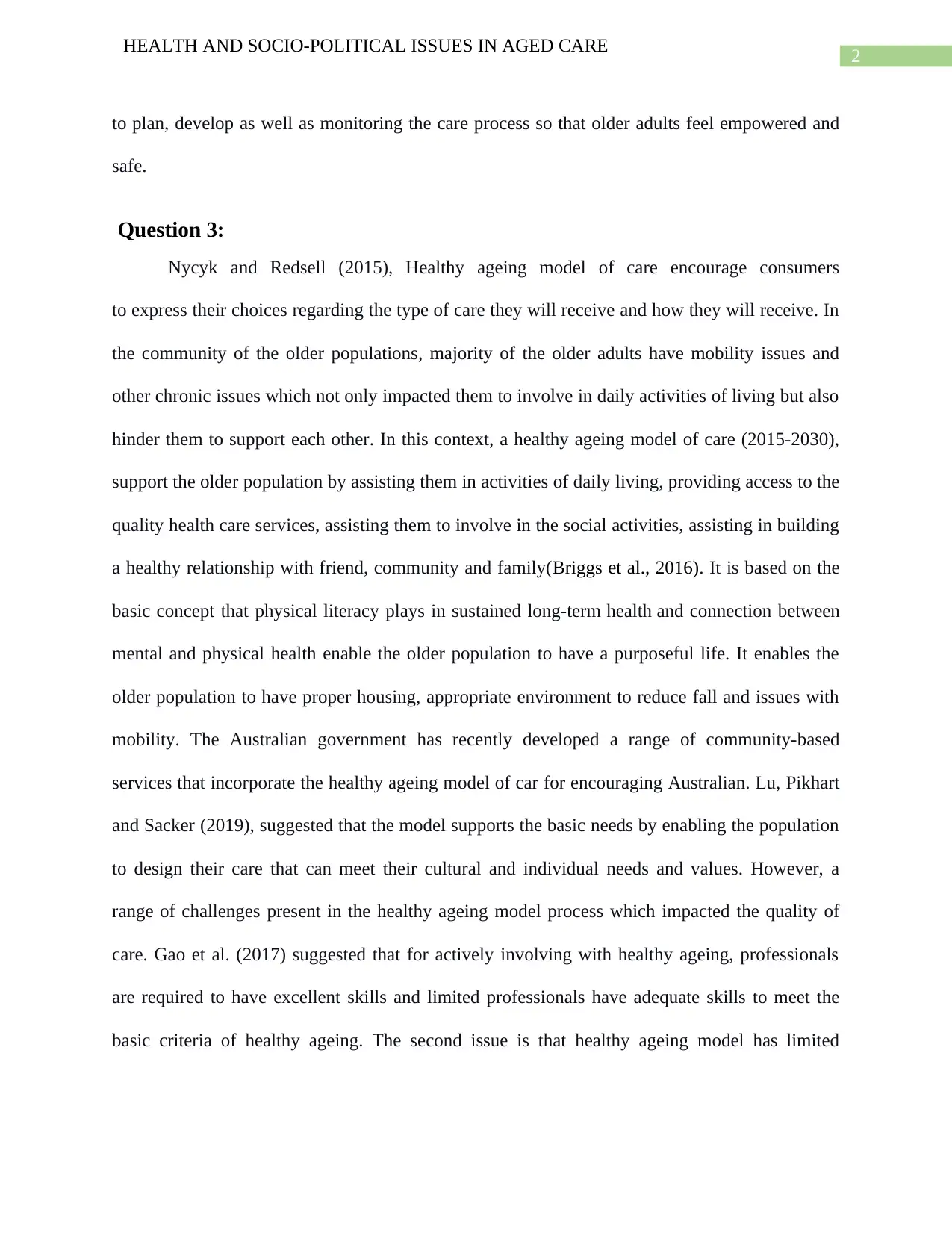
2
HEALTH AND SOCIO-POLITICAL ISSUES IN AGED CARE
to plan, develop as well as monitoring the care process so that older adults feel empowered and
safe.
Question 3:
Nycyk and Redsell (2015), Healthy ageing model of care encourage consumers
to express their choices regarding the type of care they will receive and how they will receive. In
the community of the older populations, majority of the older adults have mobility issues and
other chronic issues which not only impacted them to involve in daily activities of living but also
hinder them to support each other. In this context, a healthy ageing model of care (2015-2030),
support the older population by assisting them in activities of daily living, providing access to the
quality health care services, assisting them to involve in the social activities, assisting in building
a healthy relationship with friend, community and family(Briggs et al., 2016). It is based on the
basic concept that physical literacy plays in sustained long-term health and connection between
mental and physical health enable the older population to have a purposeful life. It enables the
older population to have proper housing, appropriate environment to reduce fall and issues with
mobility. The Australian government has recently developed a range of community-based
services that incorporate the healthy ageing model of car for encouraging Australian. Lu, Pikhart
and Sacker (2019), suggested that the model supports the basic needs by enabling the population
to design their care that can meet their cultural and individual needs and values. However, a
range of challenges present in the healthy ageing model process which impacted the quality of
care. Gao et al. (2017) suggested that for actively involving with healthy ageing, professionals
are required to have excellent skills and limited professionals have adequate skills to meet the
basic criteria of healthy ageing. The second issue is that healthy ageing model has limited
HEALTH AND SOCIO-POLITICAL ISSUES IN AGED CARE
to plan, develop as well as monitoring the care process so that older adults feel empowered and
safe.
Question 3:
Nycyk and Redsell (2015), Healthy ageing model of care encourage consumers
to express their choices regarding the type of care they will receive and how they will receive. In
the community of the older populations, majority of the older adults have mobility issues and
other chronic issues which not only impacted them to involve in daily activities of living but also
hinder them to support each other. In this context, a healthy ageing model of care (2015-2030),
support the older population by assisting them in activities of daily living, providing access to the
quality health care services, assisting them to involve in the social activities, assisting in building
a healthy relationship with friend, community and family(Briggs et al., 2016). It is based on the
basic concept that physical literacy plays in sustained long-term health and connection between
mental and physical health enable the older population to have a purposeful life. It enables the
older population to have proper housing, appropriate environment to reduce fall and issues with
mobility. The Australian government has recently developed a range of community-based
services that incorporate the healthy ageing model of car for encouraging Australian. Lu, Pikhart
and Sacker (2019), suggested that the model supports the basic needs by enabling the population
to design their care that can meet their cultural and individual needs and values. However, a
range of challenges present in the healthy ageing model process which impacted the quality of
care. Gao et al. (2017) suggested that for actively involving with healthy ageing, professionals
are required to have excellent skills and limited professionals have adequate skills to meet the
basic criteria of healthy ageing. The second issue is that healthy ageing model has limited
⊘ This is a preview!⊘
Do you want full access?
Subscribe today to unlock all pages.

Trusted by 1+ million students worldwide
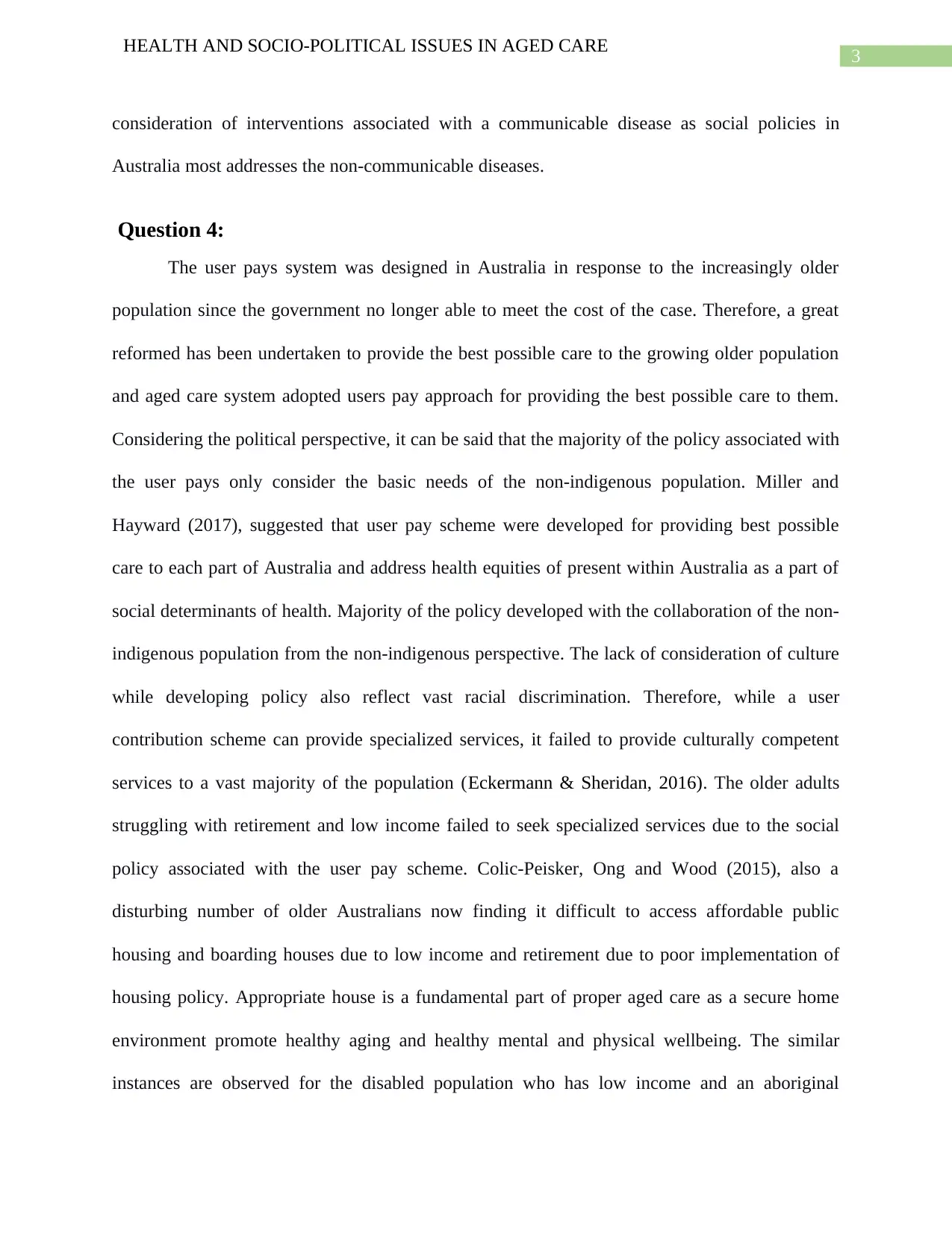
3
HEALTH AND SOCIO-POLITICAL ISSUES IN AGED CARE
consideration of interventions associated with a communicable disease as social policies in
Australia most addresses the non-communicable diseases.
Question 4:
The user pays system was designed in Australia in response to the increasingly older
population since the government no longer able to meet the cost of the case. Therefore, a great
reformed has been undertaken to provide the best possible care to the growing older population
and aged care system adopted users pay approach for providing the best possible care to them.
Considering the political perspective, it can be said that the majority of the policy associated with
the user pays only consider the basic needs of the non-indigenous population. Miller and
Hayward (2017), suggested that user pay scheme were developed for providing best possible
care to each part of Australia and address health equities of present within Australia as a part of
social determinants of health. Majority of the policy developed with the collaboration of the non-
indigenous population from the non-indigenous perspective. The lack of consideration of culture
while developing policy also reflect vast racial discrimination. Therefore, while a user
contribution scheme can provide specialized services, it failed to provide culturally competent
services to a vast majority of the population (Eckermann & Sheridan, 2016). The older adults
struggling with retirement and low income failed to seek specialized services due to the social
policy associated with the user pay scheme. Colic-Peisker, Ong and Wood (2015), also a
disturbing number of older Australians now finding it difficult to access affordable public
housing and boarding houses due to low income and retirement due to poor implementation of
housing policy. Appropriate house is a fundamental part of proper aged care as a secure home
environment promote healthy aging and healthy mental and physical wellbeing. The similar
instances are observed for the disabled population who has low income and an aboriginal
HEALTH AND SOCIO-POLITICAL ISSUES IN AGED CARE
consideration of interventions associated with a communicable disease as social policies in
Australia most addresses the non-communicable diseases.
Question 4:
The user pays system was designed in Australia in response to the increasingly older
population since the government no longer able to meet the cost of the case. Therefore, a great
reformed has been undertaken to provide the best possible care to the growing older population
and aged care system adopted users pay approach for providing the best possible care to them.
Considering the political perspective, it can be said that the majority of the policy associated with
the user pays only consider the basic needs of the non-indigenous population. Miller and
Hayward (2017), suggested that user pay scheme were developed for providing best possible
care to each part of Australia and address health equities of present within Australia as a part of
social determinants of health. Majority of the policy developed with the collaboration of the non-
indigenous population from the non-indigenous perspective. The lack of consideration of culture
while developing policy also reflect vast racial discrimination. Therefore, while a user
contribution scheme can provide specialized services, it failed to provide culturally competent
services to a vast majority of the population (Eckermann & Sheridan, 2016). The older adults
struggling with retirement and low income failed to seek specialized services due to the social
policy associated with the user pay scheme. Colic-Peisker, Ong and Wood (2015), also a
disturbing number of older Australians now finding it difficult to access affordable public
housing and boarding houses due to low income and retirement due to poor implementation of
housing policy. Appropriate house is a fundamental part of proper aged care as a secure home
environment promote healthy aging and healthy mental and physical wellbeing. The similar
instances are observed for the disabled population who has low income and an aboriginal
Paraphrase This Document
Need a fresh take? Get an instant paraphrase of this document with our AI Paraphraser
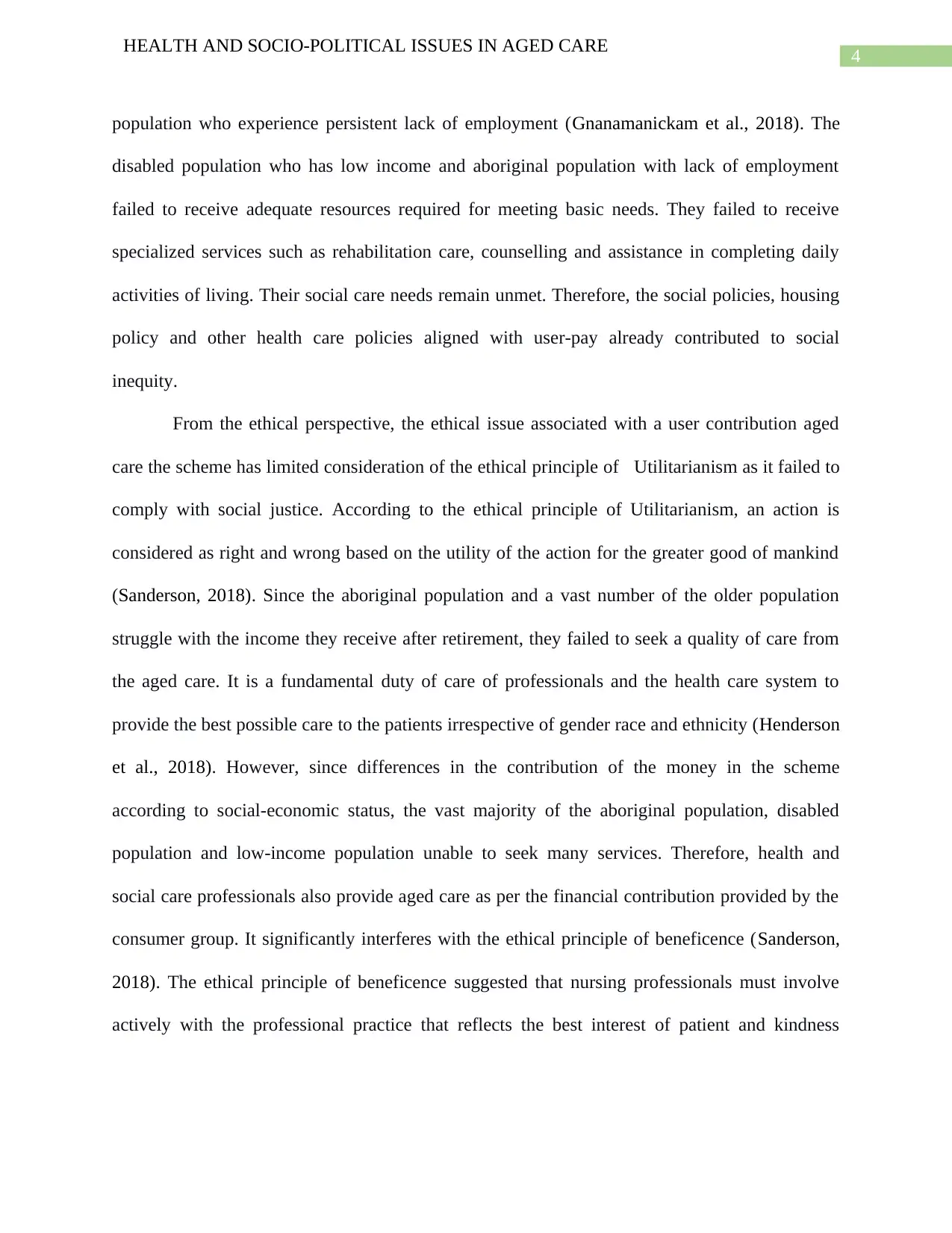
4
HEALTH AND SOCIO-POLITICAL ISSUES IN AGED CARE
population who experience persistent lack of employment (Gnanamanickam et al., 2018). The
disabled population who has low income and aboriginal population with lack of employment
failed to receive adequate resources required for meeting basic needs. They failed to receive
specialized services such as rehabilitation care, counselling and assistance in completing daily
activities of living. Their social care needs remain unmet. Therefore, the social policies, housing
policy and other health care policies aligned with user-pay already contributed to social
inequity.
From the ethical perspective, the ethical issue associated with a user contribution aged
care the scheme has limited consideration of the ethical principle of Utilitarianism as it failed to
comply with social justice. According to the ethical principle of Utilitarianism, an action is
considered as right and wrong based on the utility of the action for the greater good of mankind
(Sanderson, 2018). Since the aboriginal population and a vast number of the older population
struggle with the income they receive after retirement, they failed to seek a quality of care from
the aged care. It is a fundamental duty of care of professionals and the health care system to
provide the best possible care to the patients irrespective of gender race and ethnicity (Henderson
et al., 2018). However, since differences in the contribution of the money in the scheme
according to social-economic status, the vast majority of the aboriginal population, disabled
population and low-income population unable to seek many services. Therefore, health and
social care professionals also provide aged care as per the financial contribution provided by the
consumer group. It significantly interferes with the ethical principle of beneficence (Sanderson,
2018). The ethical principle of beneficence suggested that nursing professionals must involve
actively with the professional practice that reflects the best interest of patient and kindness
HEALTH AND SOCIO-POLITICAL ISSUES IN AGED CARE
population who experience persistent lack of employment (Gnanamanickam et al., 2018). The
disabled population who has low income and aboriginal population with lack of employment
failed to receive adequate resources required for meeting basic needs. They failed to receive
specialized services such as rehabilitation care, counselling and assistance in completing daily
activities of living. Their social care needs remain unmet. Therefore, the social policies, housing
policy and other health care policies aligned with user-pay already contributed to social
inequity.
From the ethical perspective, the ethical issue associated with a user contribution aged
care the scheme has limited consideration of the ethical principle of Utilitarianism as it failed to
comply with social justice. According to the ethical principle of Utilitarianism, an action is
considered as right and wrong based on the utility of the action for the greater good of mankind
(Sanderson, 2018). Since the aboriginal population and a vast number of the older population
struggle with the income they receive after retirement, they failed to seek a quality of care from
the aged care. It is a fundamental duty of care of professionals and the health care system to
provide the best possible care to the patients irrespective of gender race and ethnicity (Henderson
et al., 2018). However, since differences in the contribution of the money in the scheme
according to social-economic status, the vast majority of the aboriginal population, disabled
population and low-income population unable to seek many services. Therefore, health and
social care professionals also provide aged care as per the financial contribution provided by the
consumer group. It significantly interferes with the ethical principle of beneficence (Sanderson,
2018). The ethical principle of beneficence suggested that nursing professionals must involve
actively with the professional practice that reflects the best interest of patient and kindness

5
HEALTH AND SOCIO-POLITICAL ISSUES IN AGED CARE
(Briggs et al., 2016).. In this context, the user pay scheme failed to comply with this ethical
principle.
HEALTH AND SOCIO-POLITICAL ISSUES IN AGED CARE
(Briggs et al., 2016).. In this context, the user pay scheme failed to comply with this ethical
principle.
⊘ This is a preview!⊘
Do you want full access?
Subscribe today to unlock all pages.

Trusted by 1+ million students worldwide
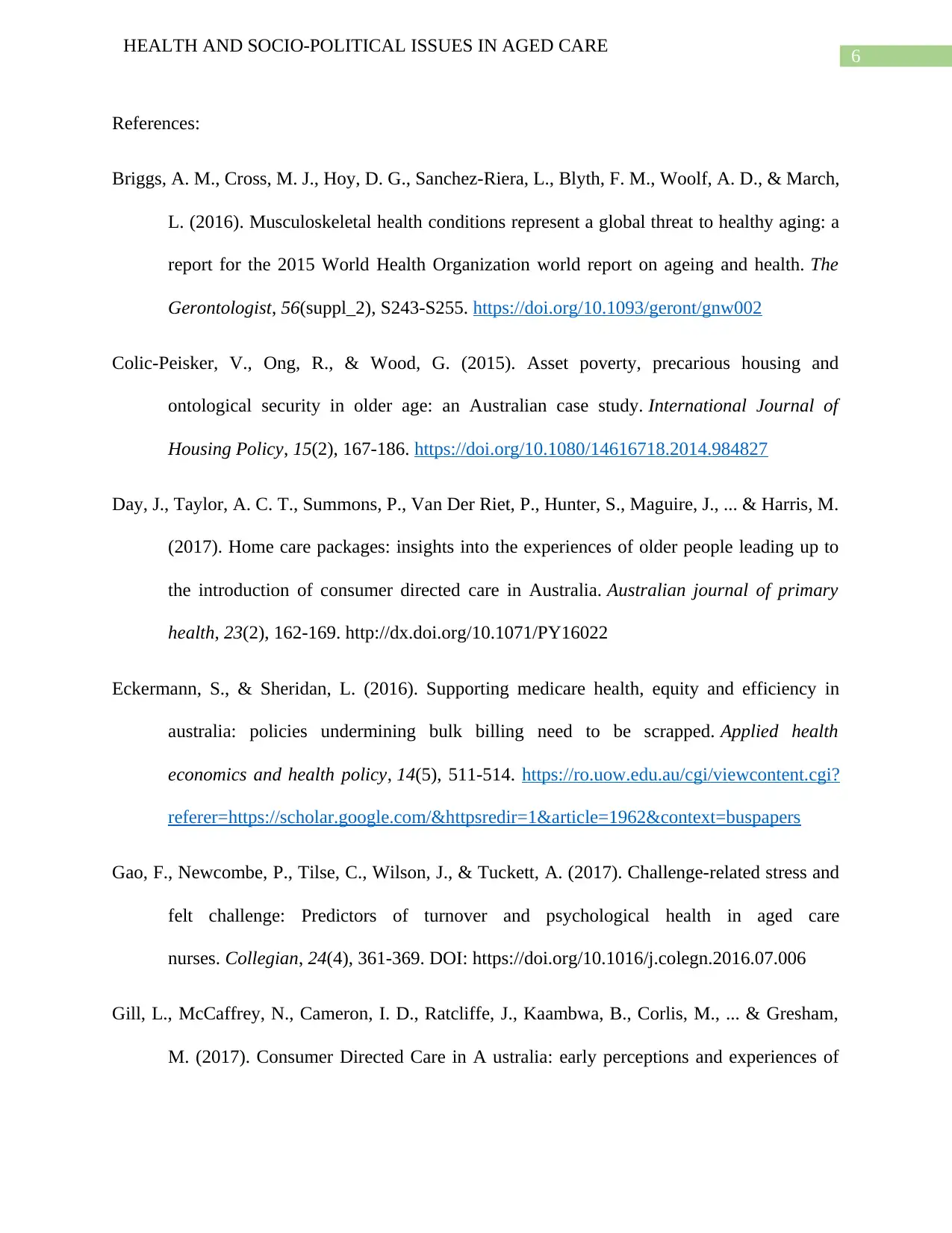
6
HEALTH AND SOCIO-POLITICAL ISSUES IN AGED CARE
References:
Briggs, A. M., Cross, M. J., Hoy, D. G., Sanchez-Riera, L., Blyth, F. M., Woolf, A. D., & March,
L. (2016). Musculoskeletal health conditions represent a global threat to healthy aging: a
report for the 2015 World Health Organization world report on ageing and health. The
Gerontologist, 56(suppl_2), S243-S255. https://doi.org/10.1093/geront/gnw002
Colic-Peisker, V., Ong, R., & Wood, G. (2015). Asset poverty, precarious housing and
ontological security in older age: an Australian case study. International Journal of
Housing Policy, 15(2), 167-186. https://doi.org/10.1080/14616718.2014.984827
Day, J., Taylor, A. C. T., Summons, P., Van Der Riet, P., Hunter, S., Maguire, J., ... & Harris, M.
(2017). Home care packages: insights into the experiences of older people leading up to
the introduction of consumer directed care in Australia. Australian journal of primary
health, 23(2), 162-169. http://dx.doi.org/10.1071/PY16022
Eckermann, S., & Sheridan, L. (2016). Supporting medicare health, equity and efficiency in
australia: policies undermining bulk billing need to be scrapped. Applied health
economics and health policy, 14(5), 511-514. https://ro.uow.edu.au/cgi/viewcontent.cgi?
referer=https://scholar.google.com/&httpsredir=1&article=1962&context=buspapers
Gao, F., Newcombe, P., Tilse, C., Wilson, J., & Tuckett, A. (2017). Challenge-related stress and
felt challenge: Predictors of turnover and psychological health in aged care
nurses. Collegian, 24(4), 361-369. DOI: https://doi.org/10.1016/j.colegn.2016.07.006
Gill, L., McCaffrey, N., Cameron, I. D., Ratcliffe, J., Kaambwa, B., Corlis, M., ... & Gresham,
M. (2017). Consumer Directed Care in A ustralia: early perceptions and experiences of
HEALTH AND SOCIO-POLITICAL ISSUES IN AGED CARE
References:
Briggs, A. M., Cross, M. J., Hoy, D. G., Sanchez-Riera, L., Blyth, F. M., Woolf, A. D., & March,
L. (2016). Musculoskeletal health conditions represent a global threat to healthy aging: a
report for the 2015 World Health Organization world report on ageing and health. The
Gerontologist, 56(suppl_2), S243-S255. https://doi.org/10.1093/geront/gnw002
Colic-Peisker, V., Ong, R., & Wood, G. (2015). Asset poverty, precarious housing and
ontological security in older age: an Australian case study. International Journal of
Housing Policy, 15(2), 167-186. https://doi.org/10.1080/14616718.2014.984827
Day, J., Taylor, A. C. T., Summons, P., Van Der Riet, P., Hunter, S., Maguire, J., ... & Harris, M.
(2017). Home care packages: insights into the experiences of older people leading up to
the introduction of consumer directed care in Australia. Australian journal of primary
health, 23(2), 162-169. http://dx.doi.org/10.1071/PY16022
Eckermann, S., & Sheridan, L. (2016). Supporting medicare health, equity and efficiency in
australia: policies undermining bulk billing need to be scrapped. Applied health
economics and health policy, 14(5), 511-514. https://ro.uow.edu.au/cgi/viewcontent.cgi?
referer=https://scholar.google.com/&httpsredir=1&article=1962&context=buspapers
Gao, F., Newcombe, P., Tilse, C., Wilson, J., & Tuckett, A. (2017). Challenge-related stress and
felt challenge: Predictors of turnover and psychological health in aged care
nurses. Collegian, 24(4), 361-369. DOI: https://doi.org/10.1016/j.colegn.2016.07.006
Gill, L., McCaffrey, N., Cameron, I. D., Ratcliffe, J., Kaambwa, B., Corlis, M., ... & Gresham,
M. (2017). Consumer Directed Care in A ustralia: early perceptions and experiences of
Paraphrase This Document
Need a fresh take? Get an instant paraphrase of this document with our AI Paraphraser
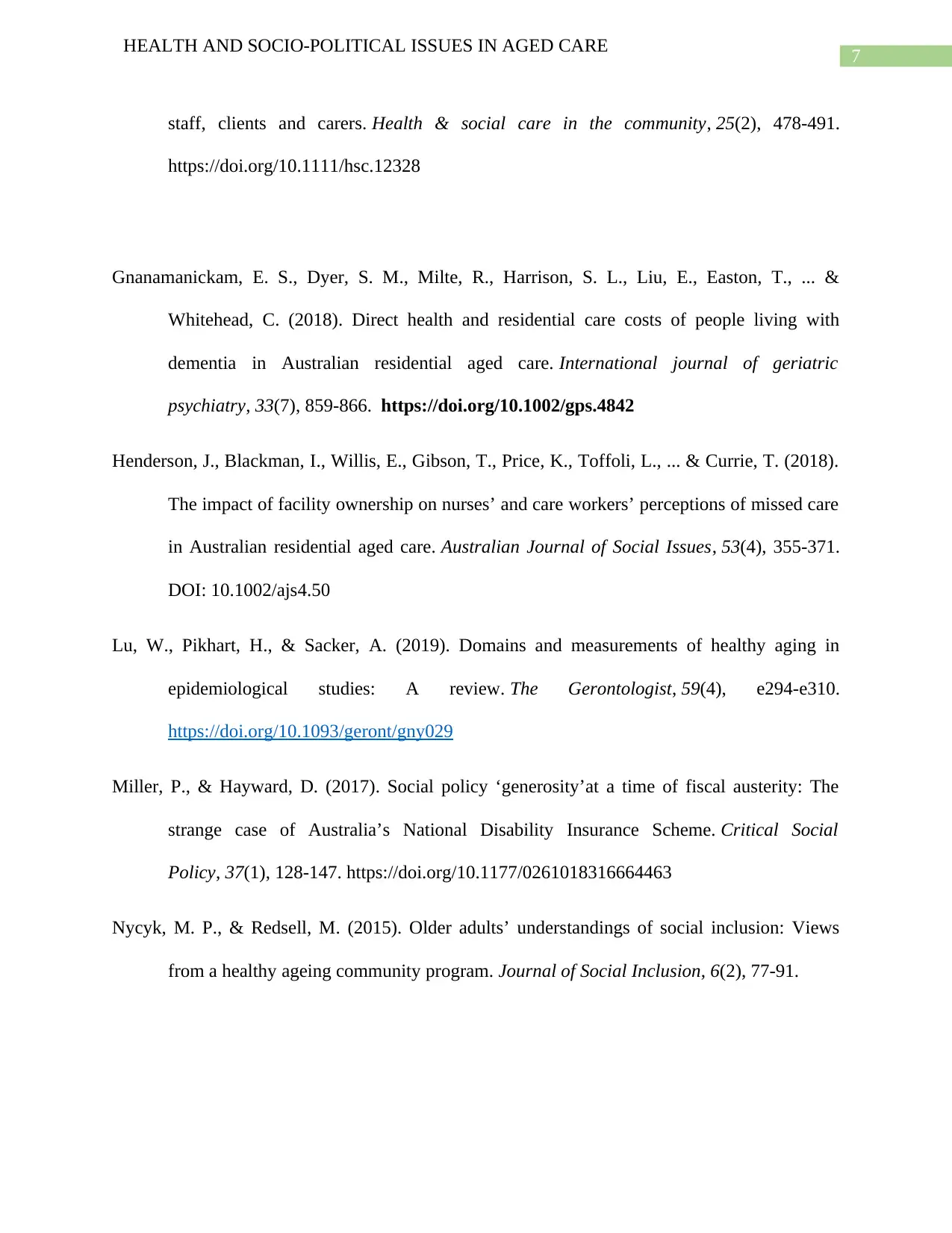
7
HEALTH AND SOCIO-POLITICAL ISSUES IN AGED CARE
staff, clients and carers. Health & social care in the community, 25(2), 478-491.
https://doi.org/10.1111/hsc.12328
Gnanamanickam, E. S., Dyer, S. M., Milte, R., Harrison, S. L., Liu, E., Easton, T., ... &
Whitehead, C. (2018). Direct health and residential care costs of people living with
dementia in Australian residential aged care. International journal of geriatric
psychiatry, 33(7), 859-866. https://doi.org/10.1002/gps.4842
Henderson, J., Blackman, I., Willis, E., Gibson, T., Price, K., Toffoli, L., ... & Currie, T. (2018).
The impact of facility ownership on nurses’ and care workers’ perceptions of missed care
in Australian residential aged care. Australian Journal of Social Issues, 53(4), 355-371.
DOI: 10.1002/ajs4.50
Lu, W., Pikhart, H., & Sacker, A. (2019). Domains and measurements of healthy aging in
epidemiological studies: A review. The Gerontologist, 59(4), e294-e310.
https://doi.org/10.1093/geront/gny029
Miller, P., & Hayward, D. (2017). Social policy ‘generosity’at a time of fiscal austerity: The
strange case of Australia’s National Disability Insurance Scheme. Critical Social
Policy, 37(1), 128-147. https://doi.org/10.1177/0261018316664463
Nycyk, M. P., & Redsell, M. (2015). Older adults’ understandings of social inclusion: Views
from a healthy ageing community program. Journal of Social Inclusion, 6(2), 77-91.
HEALTH AND SOCIO-POLITICAL ISSUES IN AGED CARE
staff, clients and carers. Health & social care in the community, 25(2), 478-491.
https://doi.org/10.1111/hsc.12328
Gnanamanickam, E. S., Dyer, S. M., Milte, R., Harrison, S. L., Liu, E., Easton, T., ... &
Whitehead, C. (2018). Direct health and residential care costs of people living with
dementia in Australian residential aged care. International journal of geriatric
psychiatry, 33(7), 859-866. https://doi.org/10.1002/gps.4842
Henderson, J., Blackman, I., Willis, E., Gibson, T., Price, K., Toffoli, L., ... & Currie, T. (2018).
The impact of facility ownership on nurses’ and care workers’ perceptions of missed care
in Australian residential aged care. Australian Journal of Social Issues, 53(4), 355-371.
DOI: 10.1002/ajs4.50
Lu, W., Pikhart, H., & Sacker, A. (2019). Domains and measurements of healthy aging in
epidemiological studies: A review. The Gerontologist, 59(4), e294-e310.
https://doi.org/10.1093/geront/gny029
Miller, P., & Hayward, D. (2017). Social policy ‘generosity’at a time of fiscal austerity: The
strange case of Australia’s National Disability Insurance Scheme. Critical Social
Policy, 37(1), 128-147. https://doi.org/10.1177/0261018316664463
Nycyk, M. P., & Redsell, M. (2015). Older adults’ understandings of social inclusion: Views
from a healthy ageing community program. Journal of Social Inclusion, 6(2), 77-91.
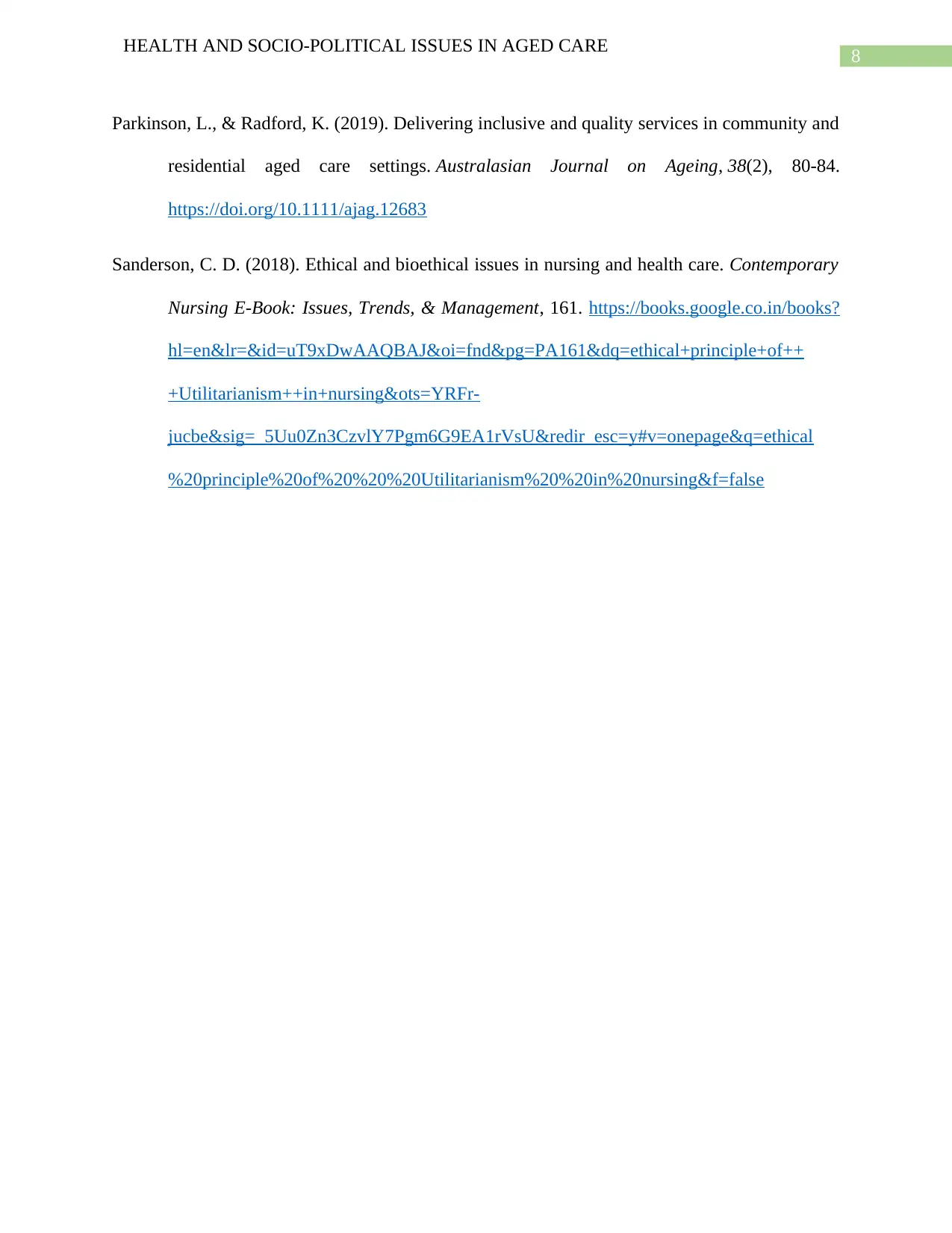
8
HEALTH AND SOCIO-POLITICAL ISSUES IN AGED CARE
Parkinson, L., & Radford, K. (2019). Delivering inclusive and quality services in community and
residential aged care settings. Australasian Journal on Ageing, 38(2), 80-84.
https://doi.org/10.1111/ajag.12683
Sanderson, C. D. (2018). Ethical and bioethical issues in nursing and health care. Contemporary
Nursing E-Book: Issues, Trends, & Management, 161. https://books.google.co.in/books?
hl=en&lr=&id=uT9xDwAAQBAJ&oi=fnd&pg=PA161&dq=ethical+principle+of++
+Utilitarianism++in+nursing&ots=YRFr-
jucbe&sig=_5Uu0Zn3CzvlY7Pgm6G9EA1rVsU&redir_esc=y#v=onepage&q=ethical
%20principle%20of%20%20%20Utilitarianism%20%20in%20nursing&f=false
HEALTH AND SOCIO-POLITICAL ISSUES IN AGED CARE
Parkinson, L., & Radford, K. (2019). Delivering inclusive and quality services in community and
residential aged care settings. Australasian Journal on Ageing, 38(2), 80-84.
https://doi.org/10.1111/ajag.12683
Sanderson, C. D. (2018). Ethical and bioethical issues in nursing and health care. Contemporary
Nursing E-Book: Issues, Trends, & Management, 161. https://books.google.co.in/books?
hl=en&lr=&id=uT9xDwAAQBAJ&oi=fnd&pg=PA161&dq=ethical+principle+of++
+Utilitarianism++in+nursing&ots=YRFr-
jucbe&sig=_5Uu0Zn3CzvlY7Pgm6G9EA1rVsU&redir_esc=y#v=onepage&q=ethical
%20principle%20of%20%20%20Utilitarianism%20%20in%20nursing&f=false
⊘ This is a preview!⊘
Do you want full access?
Subscribe today to unlock all pages.

Trusted by 1+ million students worldwide
1 out of 9
Related Documents
Your All-in-One AI-Powered Toolkit for Academic Success.
+13062052269
info@desklib.com
Available 24*7 on WhatsApp / Email
![[object Object]](/_next/static/media/star-bottom.7253800d.svg)
Unlock your academic potential
Copyright © 2020–2026 A2Z Services. All Rights Reserved. Developed and managed by ZUCOL.




